Key takeaways:
- Negative energy in ministry can hinder personal confidence and community outreach efforts, highlighting the need for effective leadership in overcoming discord.
- Cultivating positive energy involves surrounding oneself with supportive individuals, practicing gratitude, and taking moments for reflection.
- Building a supportive community requires intentional connections, sharing experiences, and fostering a culture of resilience through open conversations.
- Sharing personal journeys can inspire others and create a sense of belonging, as vulnerability often encourages mutual understanding and support.
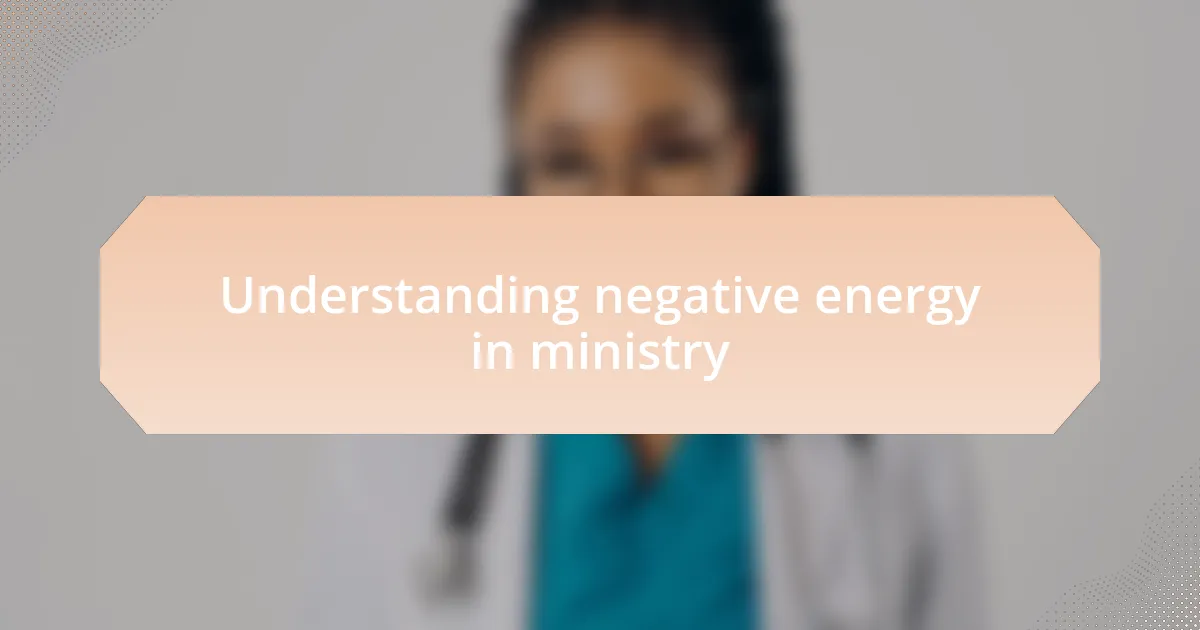
Understanding negative energy in ministry
In ministry, negative energy can manifest in many forms, from feelings of doubt to conflict among team members. I remember a time when I felt overshadowed by critics both inside and outside my ministry circle. It shook my confidence, and I found myself questioning my purpose – have you ever felt that way too?
One particularly draining experience was during a community outreach project. The atmosphere was heavy with unspoken tension when disagreements arose about our approach. I felt the weight of that negativity, and it reminded me just how crucial it is to address these feelings. How can we effectively lead if we’re burdened by discord?
It’s essential to recognize that negative energy doesn’t just impact us personally; it affects our community too. I once noticed that when I allowed negativity to linger, it created a ripple effect that affected our outreach efforts. When our focus shifts from uplifting one another to holding onto grievances, we distance ourselves from our mission of service. How can we transform that energy into something positive and uplifting?
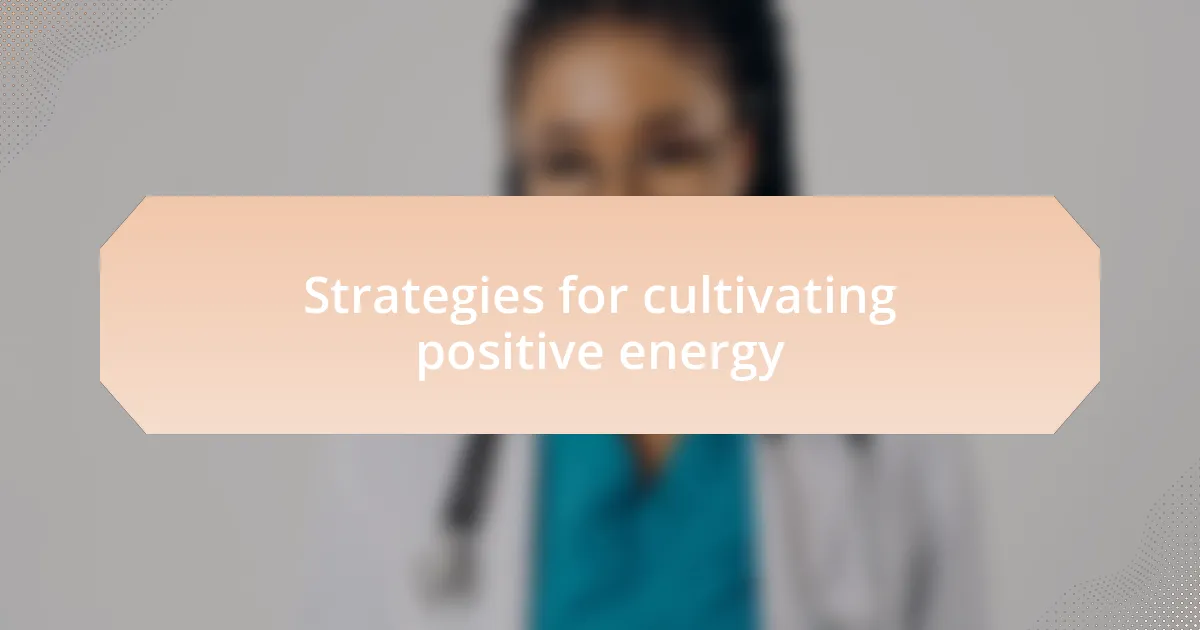
Strategies for cultivating positive energy
To cultivate positive energy, I’ve found that surrounding myself with like-minded individuals can make all the difference. During a challenging time in my ministry, I intentionally sought out conversations with those who inspired me. Their optimism was contagious, and I realized how vital it is to build a supportive network. Have you considered the impact of your community on your own energy levels?
Another effective strategy is to practice gratitude regularly. I keep a journal where I jot down three things I’m thankful for each day. This simple habit shifts my mindset from what’s going wrong to what’s going right, and it opens my eyes to the blessings that often go unnoticed. How often do we take a moment to appreciate the small victories in our ministry work?
Additionally, implementing regular moments of reflection and prayer has been a game-changer. There were days when I felt overwhelmed with anxiety, but I found that taking a few minutes to center myself could drastically alter my perspective. It’s amazing how a moment of stillness can refresh our spirits and refocus our mission. Have you carved out time for yourself amidst the busyness of ministry?
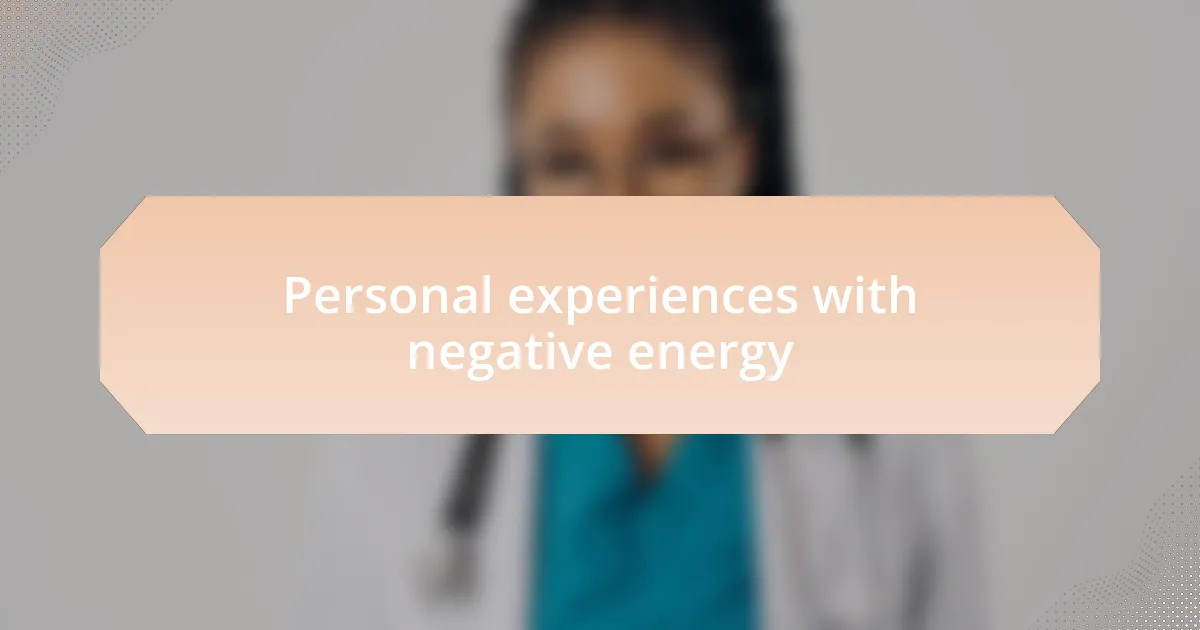
Personal experiences with negative energy
Negative energy has often found its way into my life, especially during tough seasons in my ministry. I remember vividly a time when my enthusiasm waned in the face of constant criticism. Each negative comment seemed to drain my spirit, leaving me questioning my purpose and effectiveness. Have you ever faced a similar situation where negativity threatened your sense of self?
There was a particular moment when I attended a community event, only to be met with an atmosphere filled with doubt and despair. That heaviness affected me deeply, making it difficult to focus on the message I wanted to share. I realized then that I needed to protect my energy. I began to intentionally seek out uplifting environments, reinforcing the importance of choosing where I invest my emotional resources.
On another occasion, I found myself in a conflict with a colleague that escalated into negativity. It was disheartening, and I felt myself slipping into frustration. However, I took a step back and addressed the situation with empathy. This experience taught me that acknowledging the negativity and fostering open communication can pave the way for healing. How do you handle conflicts that disrupt your peace?
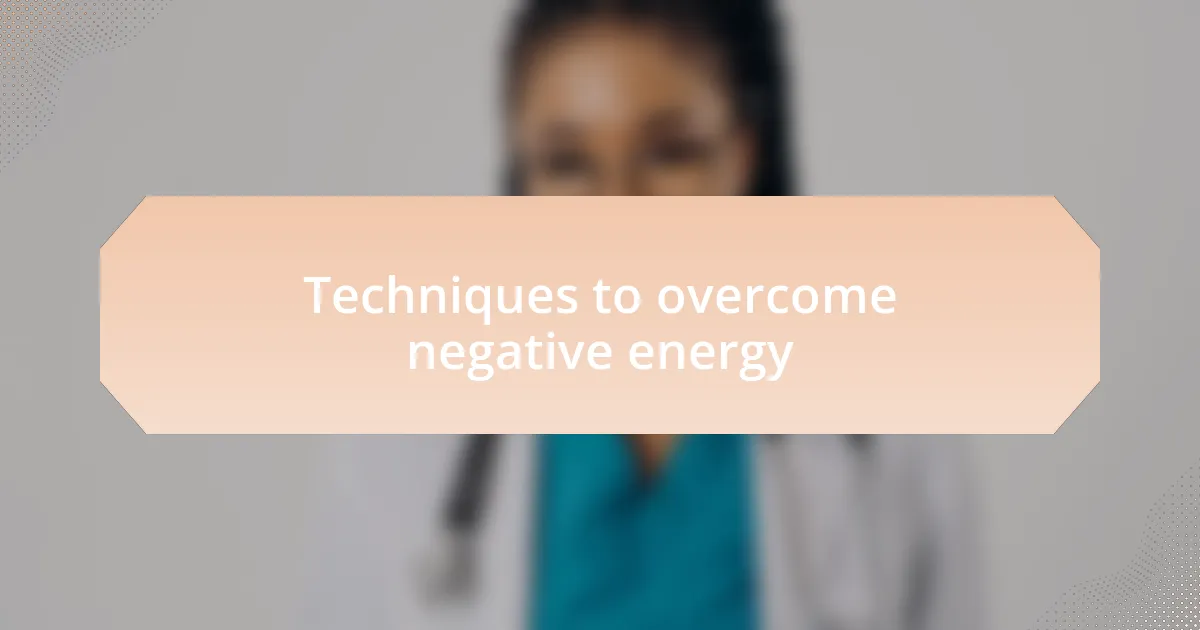
Techniques to overcome negative energy
To combat negative energy, I discovered the transformative power of mindfulness. During particularly overwhelming days, I would take a moment to breathe deeply, focusing on the present rather than the negativity swirling around me. This simple technique not only grounded me but also allowed me to shed the weight of negativity, enabling me to approach challenges with a renewed perspective.
I also embraced the practice of gratitude as a shield against negativity. There was a time when I felt surrounded by criticism and negativity from others. Instead of letting it consume me, I started jotting down three things I was grateful for each day. This small shift in focus helped me rediscover joy and cultivate a positive outlook, even in the most challenging situations. Have you ever tried capturing the good in your life to counterbalance the bad?
Engaging in physical activities has also proven to be an antidote for negative energy in my life. After a lengthy meeting filled with conflict and disagreement, I would often step outside for a brisk walk. Feeling the sun on my face and the fresh air filling my lungs rejuvenated my spirit. It’s fascinating how a change of scenery and a bit of movement can clear the mind and restore positivity, don’t you think?
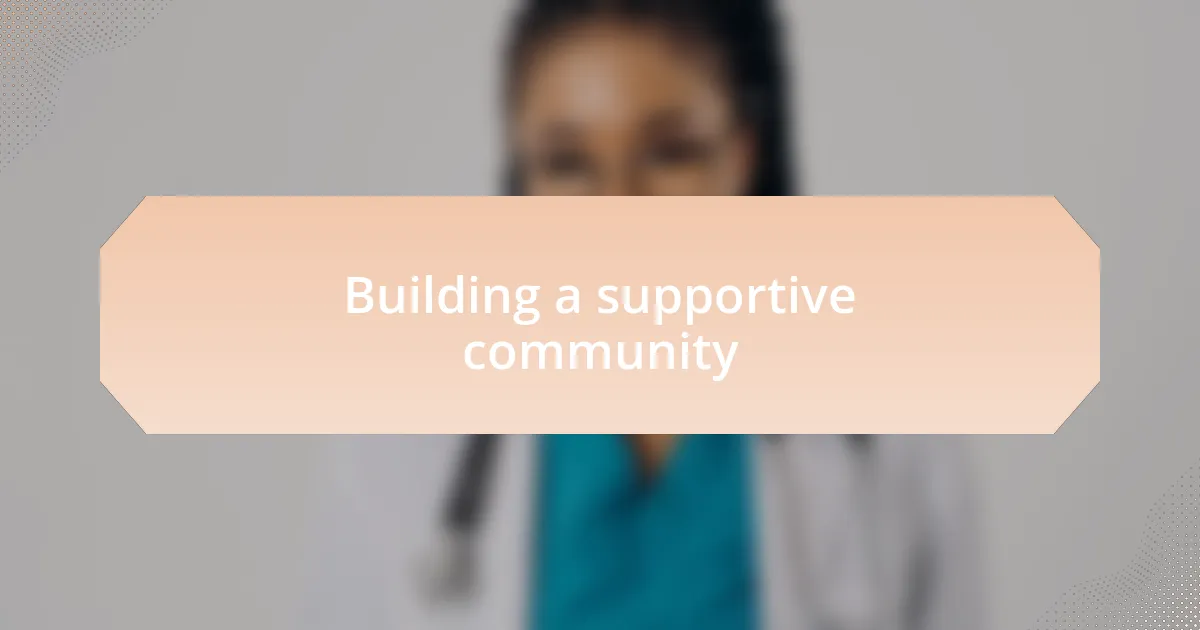
Building a supportive community
Building a supportive community requires intentionality and openness. I remember a time when I felt isolated in my challenges, unsure of where to turn. It wasn’t until I reached out and formed connections with others facing similar struggles that I began to feel the warmth of camaraderie. The conversations that blossomed from those connections were transformative, creating an environment where we could uplift one another. Have you ever experienced that sense of belonging that lifts your spirit?
In my experience, sharing laughter and joy within a community can be incredibly healing. I recall a gathering at the hospital where we organized a small talent show. Watching colleagues showcase their hidden talents broke down barriers and created a shared sense of purpose. Those moments infused our interactions with positivity, reminding me of how powerful it is to celebrate not just the victories, but the little joys in life together.
Creating this community doesn’t happen overnight; it’s a gradual process that deepens over time. I believe it begins with the simple act of listening. In hearings, I’ve observed how a compassionate ear can make someone feel valued and supported. It’s inspiring to witness the way vulnerability invites connection. Have you ever noticed how a single conversation can spark a cascade of understanding and support within a group?

Inspiring others with your journey
Sharing my journey has not only been therapeutic for me, but it has also inspired others to reflect on their own experiences. I remember a moment when I opened up about my struggles during a small group session. The response was overwhelming—others began to share their stories, creating an authentic atmosphere where we could all learn from one another. Have you ever felt that magic when someone else’s vulnerability unlocks your own?
One person reached out to me after hearing my story, sharing how my words kindled a spark of hope in their own life. It was profound to realize that my path, with all its twists and turns, could resonate and uplift someone else. I think we often underestimate the impact of our journeys; every challenge we face is a lesson learned that may help someone who feels lost. Can you recall a time when someone’s story transformed your perspective?
When we openly share our struggles, we foster a culture of resilience. There was a time when I hesitated to voice my concerns, worrying about judgment. However, once I took that leap, the conversations that followed were refreshing and enlightening. It reinforced for me that every story matters, and when we share, we pave the way for compassion and understanding. Isn’t it empowering to think that our experiences can serve as a guiding light for others?